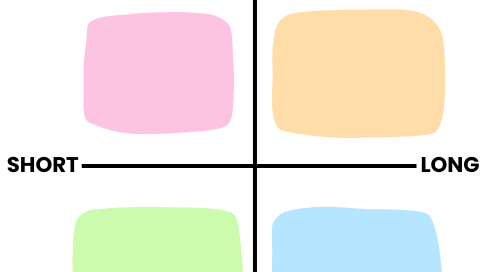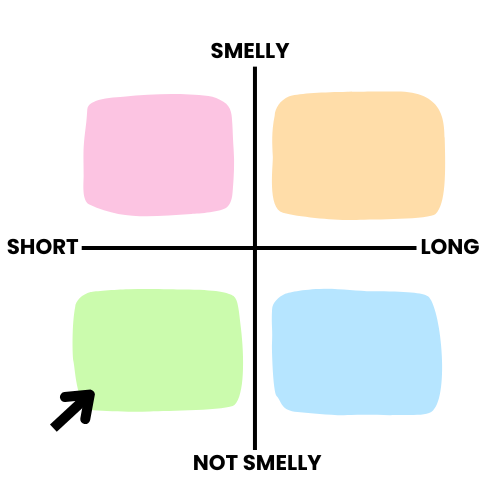Have you started passing a lot of gas recently, but don’t know why?
This article is for you.
I’m going to help you narrow down:
Why you are farting so much
What you can do to reduce it
There are four major categories of farts.
If your farts are typically very long, then it is a volume problem.
I’ll show you simple ways in which you can reduce the volume of gas you are making.
If you farts are usually very aromatic, then it is a food or bacteria problem.
I’ll help you understand how to change your diet to remove the smell.
Note: Farting is a sensitive subject and very difficult to study. 90% of this article has come from our observations on more than 4500 customers.
Category #1: Short + Smelly Farts
98% of farts contain gases that do not smell. (like nitrogen, hydrogen and methane).
If you produce short and smelly farts most of the time, it is a sign that you are eating foods that are contributing to that smell.
For most people, the culprit is likely from these two food groups, or this possible third one.
Reduce the quantity of these foods, and see if the smell goes away.
Category #2: Long+ Smelly Farts
Gut bacteria are the only source of gas inside the digestive system.
If your farts are both long and smelly, it is a clear sign that:
Food is moving very slowly through your digestive system and/or
There is an overgrowth of a certain type of bacteria
Most people with long and smelly farts usually have these symptoms too:
Get a food baby (i.e. feel bloated) everytime they eat
Feel constipated quite often
Feel tightness around belly button
Stool explodes when they sit on the toilet
Here’s why:
When food moves very slowly through your system, it ferments more.
This create more gas.
This gas is usually stuck behind stool, building a lot of pressure.
This makes your belly button (or area around it) feel quite tight.
This is also why your poop may explode in the toilet.
Food that moves slowly also gives bacteria more time to process it.
The result: bacterial overgrowth.
More bacteria + same amount of food = more gas.
The cycle repeats, and you feel bloated whenever you eat anything.
You can verify how slow you digestion is by eating some yellow corn…
…and seeing how long it takes to appear in your stool.
If it is more than 16 hours, your digestive system is a little slow.
To test if you have bacterial overgrowth, Google “Hydrogen breath test near me.”
If the test is positive, you’ll need a variety of herbal antimicrobial, probiotics and antibiotics to fight overgrowth.
It’s best to work with a specialist.
Category #3: Short + Not Smelly Farts
Short + not smelly farts are absolutely normal.
If they have started to happen with more frequency, it is likely that you are consuming a lot of air while eating.
Some ways to check:
Do you drink a lot of liquid with bubbles?
Do you gulp water down, instead of sipping it?
Do you talk a lot while eating?
If you eat with friends or family, are you the first to finish?
All signs that you are eating food + air.
Be more mindful, and you’ll pass less gas.
Category #4: Long + Not Smelly Farts
Long+ not smelly farts are a sign that you are eating a lot of fermentable food.
There are two types: digestible food and fermentable food.
Digestible food is absorbed by your small intestine, and doesn’t make gas.
Fermentable food is fermented by gut bacteria and produces a lot of gas.
Here is a pretty comprehensive list of fermentable foods.
Reduce the quantity and/or avoid.
Track how much difference that makes.
For farts that smell…
For farts that smell, check if you are eating from any of these two food groups:
Allium Vegetables
Cruciferous Vegetables
These ingredients contains sulphur which your gut bacteria use to make hydrogen sulfide.
Hydrogen sulfide smells like rotten eggs i.e. smelly farts.
A third potential food group that causes smelly farts: excess protein.
Excess protein is broken down into ammonia.
Ammonia smells like urine or sweat.
If your body cannot remove the excess ammonia, it comes out a smelly fart.
For long, loud farts…
For long loud farts, cut back on fermentable carbohydrates and start eating digestible carbohydrates.
Just 30gms of fermentable carbohydrate is enough to allow bacteria to produce 10L of gas.
The carbohydrates most subject to poor or incomplete absorption include:
Lactose (Found in Dairy)
Fructose (Found in Fruit)
Resistant Starch (Found in Cooled Potatoes or Rice)
Fiber
Sugar Alcohols
To reduce how much air you are consuming…
If you are taking in too much air, try these tips.
When you are eating with someone, do not talk.
Anything with bubbles in it is putting more air into your digestive system. Skip all carbonated beverages.
Don’t gulp water; sip it. Even plain water (not carbonated) when gulped carries air with it.
Stop chewing gum.
If possible, stop smoking.
More seriously helpful tips:
Food should be chewed thoroughly, soaked with saliva, and then taken down to the stomach.
Food should not be eaten before feeling hungry. In other words, only eat when you feel hungry.
Use smaller dishes and bowls. This will prevent you from overeating.
Eat raw food and cooked food separately.
To increase digestive speed…
Start everyday with a shot of fresh ginger juice. This helps to move material along your digestive system.
If you want something even stronger, try Kalmegh Bitters.
Improve your posture. Gut muscles work better with the force of gravity (not against it). Don’t slouch or lie down too much. Sit upright.
Cut out items that digest very slowly.
Liked what you read? Hit the ❤️button at the bottom, and share with at least 1 friend.
It will mean a lot :)







